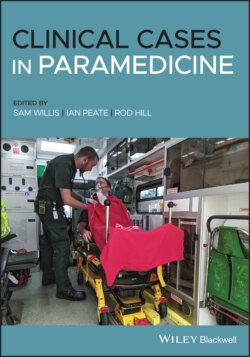Читать книгу Clinical Cases in Paramedicine - Группа авторов - Страница 43
Vital signs
ОглавлениеRR: 16 bpm
HR: 105 bpm
BP: 128/78 mmHg
SpO2: 97%
Blood glucose: not repeated
Temperature: not repeated
PEF: 380 L/min
GCS: 15/15
4 lead ECG: sinus tachycardia
1 What kinds of questions would you ask this patient specifically related to asthma as part of the history‐taking process? See Table 1.1.
Table 1.1 History‐taking questions
| Asthma history Does this feel like your normal asthma? Is this the worst it’s ever been? What time did this episode start today? Do you take your asthma medication regularly? What were you doing when it started today? What usually triggers your symptoms? When was the last time your visited your GP and/or went to hospital with these symptoms? Have you ever been intubated or been in ICU with these symptoms? Medication history What asthma medications do you take? How frequently do you have to take your medication? Do you usually have to take your inhaler while exercising? When was the last time you had a medication review with your GP? Have you had any recent changes in medication? Do you take any other medications? Have you had any coaching on the best way to take your inhaler? F/SH (family and social history) Does anyone else in your family experience asthma? Do you smoke? If so, how frequently? Do you drink or take any drugs recreationally? Who do you live with? What do you do for work? Do you exercise regularly? Are you under any particular stress at the moment? Past medical history (PMH) Do you have any other medical problems? Do you have any allergies? Have you had a cough or cold recently? |
1 The patient is 160 cm tall, what should her predicted peak expiratory flow reading (PEFR) be? Her first reading was 300 – what percentage is that from predicted? (Hint: you will be required to look this up using the Australian National Asthma Council chart found here: http://www.peakflow.com/pefr_normal_values.pdf or by doing an internet search.)400 L/min.75%.
